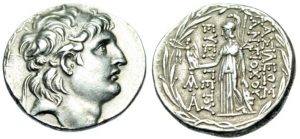
At God’s direction, Jeremiah sent a letter to the exiled people of God in Babylon which said, “But seek the welfare of the city where I have sent you into exile, and pray to the Lord on its behalf, for in its welfare you will find your welfare” (Jeremiah 29:7). They would return to their home in Jerusalem after seventy years in a foreign land. During those years, they had a calling to build up and not tear down, to pray and not curse, to seek the welfare of the city where they were exiled. Their own wellbeing depended on it.
Social Benefaction in the New Testament and Ancient World
In April’s edition of “Good News,” my article outlined how Jesus, Peter and Paul called believers to “do good,” that is, to become benefactors for the communities where they lived. Paul exhorted the believers in Galatia to “do good to all people, especially to those who belong to the family of believers” (Galatians 6:10). Peter proclaimed that Jesus was the Benefactor who “went around doing good” (Acts 10:38) and later taught Christians that “doing good” was God’s will for them (1 Peter 2:15).
Jesus taught the disciples that doing good, serving as benefactors, should not be limited to those within the community of faith: “Love your enemies, do good to those who hate you” (Luke 6:27). The Lord’s exhortation goes well beyond Aristotle’s perspective: “A (true) benefactor feels friendship and agape for the recipient of his bounty even though he is not getting anything out of him and is never likely to do so.”

Honoring Benefactors
In his book on Christian benefactors and citizens, Bruce Winter recounts the way ancient Greek and Roman communities were obliged to recognize and publicly honor those who were social benefactors: “There was an established procedure by which the particular gift of a benefactor was recognized. This was done by the erection of an inscription commemorating the event, the public praising with words of commendation, the crowning with a crown of gold, and being allocated a permanent seat of honour in the theatre” (Seek the Welfare of the City, p. 22). One such public inscription declares: “Let it be recorded to offer praise…that he does good because he indeed does good…and to render him a benefactor because he is able to be a good man and because he does good…to praise him and establish him…as a benefactor to the Athenians.”
Praising Who Do Good
Peter calls the persecuted Christians in Asia Minor to be socially engaged in their cities, acknowledging that civic authorities “praise those who do what is good.” In a world hostile to their faith, believers should “silence the ignorance of foolish people by doing good” (1 Peter 2:14-15). Paul taught Roman believers that they should not fear civic authorities but “do good, and you will receive its praise” (Romans 13:3).
Both Peter and Paul hoped that public opinion of Christians would turn from hostility to praise given the way believers sought to do good in their communities. But Paul acknowledged that the most important recognition comes from God who bestows “glory, honor and peace” upon “everyone who does good” (Romans 2:10).
Kinds of Social Benefaction
The ways people could benefit their community were legion: supplying food in times of famine, selling grain at reduced rates to help the needy, providing medical care during plagues, constructing streets, public buildings, and public utilities, or helping a city during times of civic unrest. “Doing good” was about responding in concrete ways to the real needs of a community. Or, as God said through Jeremiah, it was about seeking the welfare of the city.
Many years ago, Christians in Costa Rica founded “Caravanas de Buena Voluntad” to bring medical care to rural communities where healthcare was not available. Believers raised up clinics in San José, such as the well-respected “Clínica Bíblica.” Christians established Roblealto which seeks the welfare of children by providing foster care and social support for their families that face deep poverty. In other countries, “Food for the Hungry” provides “life-changing resources such as clean water, medical aid, food, equal educational opportunities to girls and boys, vocational training and empowerment in the midst of unimaginable hardships.”
James celebrates this kind of social benefaction as a mark of true faith: “to look after orphans and widows in their distress and to keep oneself from being polluted by the world” (James 1:27). Faith is not the same as saying to the needy, “Go in peace, stay warm, and be well fed” (James 2:16). The church Father Ambrosius railed against the lack of social benefaction coming from the idol temples of his day: “Let them count up how many captives the temples have ransomed, what food they have contributed for the poor, to what exiles they have supplied the means of living!” Christians saw the needs and responded.
The Gospel and Misión Integral
Many years ago, Latin American leaders such as Drs. René Padilla and Samuel Escobar developed what is known as “misión integral,” or “integral mission” (see, for example, Padilla’s Mission Between the Times). Based on Jesus’ teaching on the kingdom of God, they argued that the euangelion, the “gospel” or “good news” of God, comes in both word and deed (Acts 1:1). Jesus’ ministry was marked by his preaching about the kingdom of God and his demonstration of its character through his actions of healing, feeding and including those who had been excluded by the rest of society. Jesus was the Great Benefactor whose gospel could be heard and seen; it had personal and social dimensions (Luke 4:18-19).
Paul told the Galatians that “faith working through love” (Galatians 5:6) is what’s truly valuable. Or, as James put it simply, “Faith without works is dead” (James 2:16). Our faith leads us to “seek the welfare of the city.”
 Dr. Gene L. Green is the Dean of Trinity International University – Florida. Visit them at tiu.edu/florida
Dr. Gene L. Green is the Dean of Trinity International University – Florida. Visit them at tiu.edu/florida
Read last month’s article by Dr. Gene L. Green at: https://www.goodnewsfl.org/freedom-2/

Comments